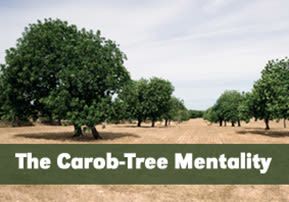
The Carob-Tree Mentality
Nothing or no one is so environmentally and socially conscious as the Torah is, which disdains greed and quick profits at the expense of the future…

Choni HaMaagal was pious miracle worker who lived in the north of Israel, near the town of Hatzor. One day, as he was walking down a Galilee country path, he saw a villager planting a carob tree.
“How long will it be,” Choni asked, “before this tree yields fruit?”
“Seventy years,” the villager answered.
“And are you sure that you will still be alive then?” Choni HaMaagal asked.
“I was born into a world with carob trees,” the man answered. “Just as my fathers planted trees for me to enjoy, so I plant trees for my children.”
The above story comes from the Gemara, tractate Taanit, page 23. It’s message is deep and very meaningful. Within it is the key the success both of society and of the individual.
So many problems today are the result of the “now only” mentality, namely, self-indulgence today and the heck  with tomorrow. Many of western society’s economic, health and environmental problems today are the result of yesterday’s lackadaisical attitude of “who cares about tomorrow.” People – and governments – just don’t stop to think, or simply don’t care, how today’s pursuit of lusts and bodily appetites will mortgage future generations.
with tomorrow. Many of western society’s economic, health and environmental problems today are the result of yesterday’s lackadaisical attitude of “who cares about tomorrow.” People – and governments – just don’t stop to think, or simply don’t care, how today’s pursuit of lusts and bodily appetites will mortgage future generations.
Look at America’s national debt of $18 trillion for 2013. This is a classic example of a plastic-purchasing lifestyle of spending money than one does not have. People wake up in the morning with $40,000 credit card back debts, the hangover of wanton spending with total inconsideration about the consequences. The same goes for the environment. Governments and greedy corporations rape our natural resources for today’s profits at the expense of tomorrow’s pollution and destruction of the environment and ecosystem. Nobody ever heard that British Petroleum was held liable in any way for contaminating the Gulf of Mexico with history’s worst oil spill, and that’s only one example of a tragically long list of corporate and governmental crimes against the environment.
The “self-indulgence today and the heck with tomorrow” mentality is not only anti-emuna, it’s the antithesis of the Torah way of thought.
The Torah way of thought both honors and treasures the environment.
The infamous Oklahoma Dust Bowl in the 1930’s resulted from planting cotton year after year with no regard as to what was happening to the soil. After years of stripping the ground of its nutrients – for short-term profits – without putting anything back in, the Oklahoma farmers were left with no top soil, the infamous “dust bowl”. This forced them to become the migrant workers that were portrayed in John Steinbeck’s classic “Grapes of Wrath”. This could not have happened with crop rotation and sabbatical years.
The Torah demands that we enable the land to have a rest once in seven years (shmitta). Even though this is a Divine decree that defies human logic, we can clearly see its benefits for the future, by insuring the fertility of the land. The Torah intrinsically discourages quick profits at the expense of the environment. Since tree fruit is orla, or forbidden for consumption during the first three years of the tree’s life, Torah-observant farmers knock the fruit-blossoms of fruit trees during this time, and enable the tree to bear fruit only in its fourth year. This not only prevents forbidden fruit from circulating in the marketplace, but it greatly extends the longevity of the tree. And as far as social orientation goes, nothing or no one is so caring and considerate of the needy as the Torah is. All the commandments tithing one’s money for charity (maaser), leaving a strip of the field unharvested for the poor (peah), and allowing the poor to glean the fields, collecting fallen grain and fruit (prat and shichecha) are only a few examples of the Torah’s social concern.
Any nation with true concern about human beings and the environment would be wise in seeking Torah-oriented advice.
Those who pursue a lifestyle of instant gratification and moral permissiveness are in effect living on the misery of future generations who will have to pay the financial and emotional consequences of coming into a world with no roots to prevent both material and spiritual erosion. When previous generations reject Torah, subsequent generations are truly a spiritual dustbowl, gone with the wind.
The fortunate emuna-oriented and Torah observant public, in contrast, passes a rich spiritual heritage from one generation to the other. They plant seeds today – both physical and spiritual – so that the bodies and the souls of their offspring will have abundant sustenance.
The Galilee villager who planted carob trees was most likely a simple Jew, but in his beautiful simplicity, he lived and breathed the Torah. His ready answer to the holy sage Choni HaMaagal exemplifies Torah lifestyle: “I’m not here to take from the world, I’m here to give to the world, to beautify it and to make it a better place!” We’d all be wise to follow suit.
The Torah outlook is a carob-tree mentality: we do things today not because of a desire for immediate gratification, but to make the world a better place for future generations. Our good deeds today will bring Mashiach tomorrow, amen!











Tell us what you think!
Thank you for your comment!
It will be published after approval by the Editor.